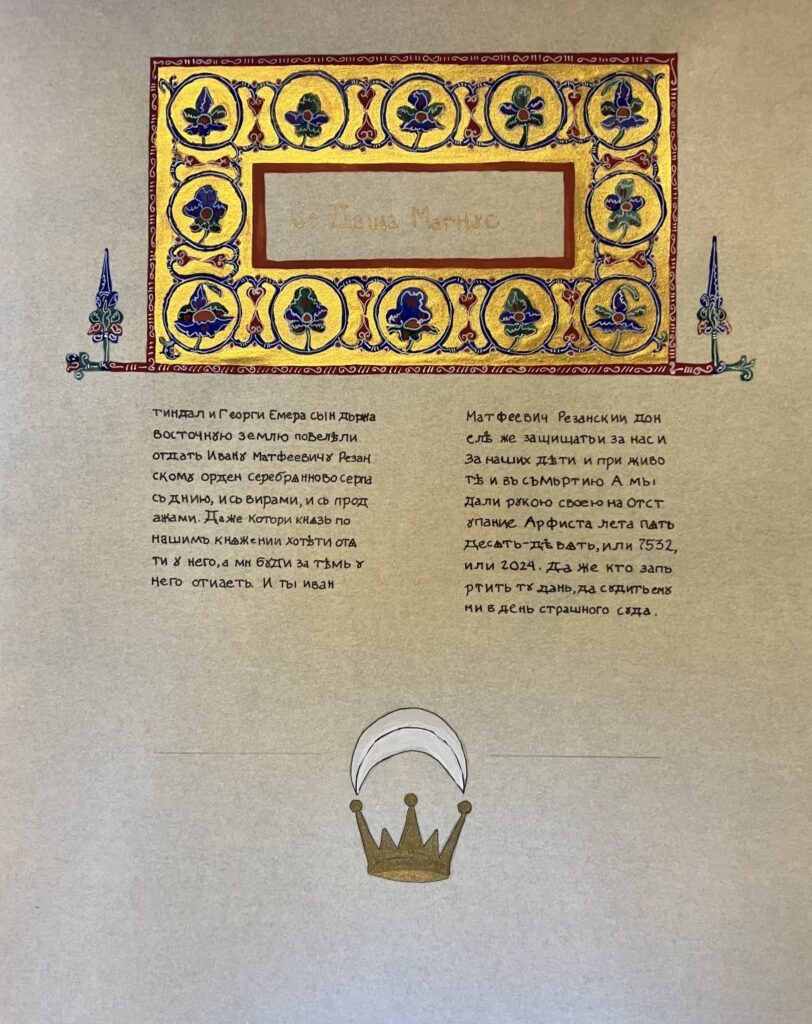This was another collaboration with Nataliia Anastasiia Evgenova Sviatoslavina vnuchka, who is always a pleasure to work with. She initially asked me to translate text she had already written, but quickly got behind my writing the text from scratch based on period text.
For this scroll, I returned to a source document I’ve used before, Charter 81 from “Charters of Great Novgorod and Pskov”. This is one of the earliest charters I’ve found, and the text is very adaptable to SCA award scrolls. As a result, I tend to use it for early-period Russian scrolls (the recipient’s persona is 11C, so this charter from 1130 CE was the closest I could readily find). Definitely need to find more early-period exemplars to work from, so as to avoid repetition.
An additional challenge to this text was adapting it to the current reign – the East currently has a King and a King-Consort, which is not something for which I’ve been able to find any exemplars in Russian. In fact, Russian scrolls are almost always done by a single monarch/noble, with no mentions of queens, spouses, etc. – medieval Russia was extremely sexist, even by medieval standards, and women were just not mentioned in legal documents. The closest I’ve found in a period charter is one where the monarch issuing the charter is ordering his son, a prince, to grant a privilege to the recipient of the charter. But that’s still very much not a document issued by two equals – the son is in a subordinate role.
So a typical charter might say something like “And so I, Kniaz So-and-so, holding these Russian lands, order the following…”. In the past, I’ve adopted it with words like “And so, we, King So-and-so, and my Queen, such-and-such, holding the lands of Someplace, are granting…”. Which worked acceptably for King and Queen, but totally breaks down for the current reign, where our monarchs ask to always be portrayed as equal rulers. The word “consort” exists in Russian, but it’s meaning is pretty strictly that of a romantic/sexual partner, so that doesn’t work. There just wasn’t any good exemplar for equal co-rulers.
So Nataliia, the Tyger Clerk of the Signet, and I went through several iterations before we settled on something that worked both sounded right for period Russian, worked in English, and met the Monarchs’ desires. We probably spent more time on the first half of the first sentence than I did writing the entire rest of the scroll.
Russian Scroll Text:
Се даша Магнус Тиндал и Георги Емера сын, дьржа Восточнγю землю, повелѣли отдать Иванγ Матфеевичγ Резанскомγ Орден Серебрѧнново Серпа, съ данию, и съ вирами, и съ продажами. Да же котори кнѧзь по нашимъ кнѧжении хотѣти отѧти γ него, а ми бγди за тѣмь γ него отимаеть. И ты Иван Матфеевич Резанскии донелѣ же защищать и за нас и за наших дѣти и при животѣ и въ съмьртию А мы дали рγкою своею на Oтстγпание Aрфиста лета пѧтьдесѧть- дѣвѧть, или 7532, или 2024. Да же кто запъртить тγ дань, да сγдить емγ ми в день страшного сγда.
English translation:
And so we, Magnus Tindal and Emerson, ruling the Eastern lands, are granting Ivan Matfeevich Rezansky membership in the Order of the Silver Crescent, accompanied with the appropriate taxes, death tolls, and rights to collect fines as befits his new station. And should even another noble in our kingdom try to take this from him, we shall punish any who so try. And you, Ivan Matfeevich Rezansky, are charged with defending us and our heirs, in life and in death. So we set our hand upon this at Harper’s Retreat, AS 51, or the year 7532 since the creation of the world, or the year 2024 in the common era. And any who seek to forbid this grant shall answer to us on a day of great judgment.
Images:
Calligraphy and Illumination by Nataliia Anastasiia Evgenova Sviatoslavina vnuchka
